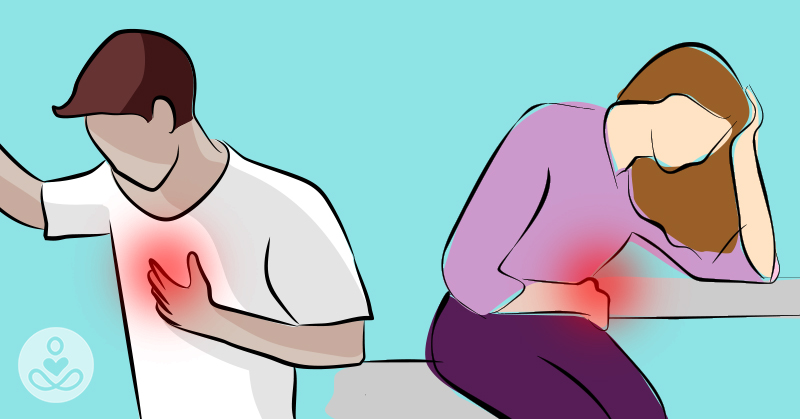Gastroesophageal reflux disease (GERD) or ‘acid reflux’ as it is more commonly called, is the medical way of describing heartburn. Actually, heartburn is a symptom of acid reflux or GERD, a problem that affects 50% of Americans. [1] Read on to learn some simple acid reflux remedies you can make (or do) at home.
Heard Of GERD?
Heartburn is what notifies you that you’ve just eaten something that disagrees with your stomach. GERD is when the acid contents of your stomach – or even pancreatic liquids – travel back up into your esophagus, causing you discomfort and even harm. [1]
The acid causes inflammation, irritation, and scarring, which can narrow the size of your esophagus. The most common symptoms are hoarseness, burning of the throat, irritation, nausea, coughing, wheezing, asthma-like symptoms, food getting stuck in your throat, and eroded tooth enamel. [1]
GERD will increase your chances of esophageal cancer, but not drastically. If acid reflux is happening for a long period of time in the lower intestines, you’ll be more likely to develop Barrett’s Esophagus, a disorder where gland cells replace squamous cells in the stomach, which, over time, can lead to dysplasia and finally cancer. [1]
A lot of people who suffer from acid reflux “just live with it”. They treat it when it’s out of hand, try to suppress it with store-bought solutions, and prolong the inevitable when eating spicy or trigger foods.
What’s Triggering Your GERD?

The first step is finding out what’s causing your GERD or acid reflux. If you are overweight or older, your abdominal fat may interfere with esophagus function. The esophageal sphincter also weakens with age. The substances below are common aggravators of GERD symptoms:
- Chocolate
- Alcohol
- Nicotine
- Caffeine
- Greasy, spicy, and/or fatty foods
Acid Reflux Remedies:
Instead of reaching for an antacid, try one of these healthy home relievers of GERD.
1. Lose weight. Studies show that losing 8-10 percent of your weight decreases acid reflux symptoms. [1]
2. Change your diet. “Don’t get too excited; it only makes a difference for about 30 percent of people,” says Patricia Raymond, a gastroenterologist in Chesapeake, VA. “Plus, the problem with the diet is that we find most people would rather die than be on that diet for the rest of their life.” A great starting point is simply removing the common offenders listed above and cutting out all processed, junk and fast food from your diet. [1]
3. Room temperature water and lemon. “By drinking this on an empty stomach 15 to 20 minutes before eating anything else, the body can naturally balance out its acid levels,” says Rebekah Fedrowitz, an applied holistic nutritionist. The reason you don’t want cold water is because it tends to stress your stomach and intestines. Warmer water is more naturally accepted by your esophagus, stomach, and body. Just think of what you do when you’re cold – you tense up and shiver to keep warm. [2]
4. A tablespoon of baking soda in a half cup water — not tasty but effective. [2]
5. Apple cider vinegar. If you’ve been reading The Hearty Soul, you’ll know how great ACV is and how multi-purpose this little wonder can be. “Many people mistakenly believe all acid reflux and indigestion is caused by an overproduction of acid. The latest research shows it’s actually the opposite for many people: There is too little acid produced to adequately digest the food eaten,” says Christina K. Major, holistic nutritionist and naturopathic doctor in Trevorton, PA. Pickles, sauerkraut, and other highly acidic foods also work well to help stimulate acid. [2]
6. “Supplement with Saccharomyces boulardii, a probiotic strain specifically for the small intestine to help optimize absorption of key vitamins for optimal digestive health,” says Stella Metsovas, author of “The 21 Day Digestive Health Detox.” [2]
7. Slippery elm is another herbal supplement you can try in capsule, powder, or lozenge form. It will soothe the irritated tissues of your digestive tract. [2]
8. Tea time. Chamomile or fenugreek tea may help reduce acid reflux symptoms. Peppermint tea is one of my favorite post-meal teas because it always helps with a full or upset stomach. [2]
9. Chewing gum. Grab a stick of gum and it will increase your saliva production, which reduces acid levels in the esophagus.[2]
10. Sleep on your left side. This is arguably the most interesting advice. Studies found that sleeping on your stomach or your right side causes undue pressure on your intestines and increases GERD symptoms. Sleeping on the left side proved to relieve test subjects. [3]
Reach For The Right Stuff
Next time you have tacos, pizza, or any of your GERD-trigger foods, grab a red delicious apple for dessert instead and follow that up with a piece of gum.
Oh – and quit sleeping on your stomach!

Sources
- [1] GERD. (2014, July 31). Retrieved from https://www.mayoclinic.org/diseases-conditions/gerd/basics/definition/con-20025201
- [2] Nelson, J. (2016, January 12). 13 surprising home remedies for acid reflux. Retrieved from https://www.mnn.com/health/fitness-well-being/stories/13-surprising-home-remedies-for-acid-reflux
- [3] Khoury, R. M., Camacho-Lobato, L., Katz, P. O., Mohiuddin, M. A., & Castell, D. O. (1999, August 01). Influence of spontaneous sleep positions on nighttime recumbent reflux in patients with gastroesophageal reflux disease. Retrieved from https://www.nature.com/ajg/journal/v94/n8/abs/ajg1999503a.html

